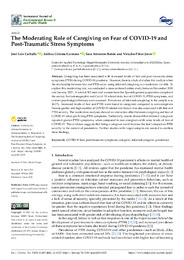Please use this identifier to cite or link to this item:
https://hdl.handle.net/11000/34908Full metadata record
| DC Field | Value | Language |
|---|---|---|
| dc.contributor.author | Carballo, José Luis | - |
| dc.contributor.author | Coloma-Carmona, Ainhoa | - |
| dc.contributor.author | Arteseros Bañón, Sara | - |
| dc.contributor.author | Pérez-Jover, Virtudes | - |
| dc.contributor.other | Departamentos de la UMH::Psicología de la Salud | es_ES |
| dc.date.accessioned | 2025-01-18T09:51:12Z | - |
| dc.date.available | 2025-01-18T09:51:12Z | - |
| dc.date.created | 2021-06 | - |
| dc.identifier.citation | J. Environ. Res. Public Health 2021, 18, 6125 | es_ES |
| dc.identifier.issn | 1660-4601 | - |
| dc.identifier.issn | 1661-7827 | - |
| dc.identifier.uri | https://hdl.handle.net/11000/34908 | - |
| dc.description.abstract | Caregiving has been associated with increased levels of fear and post-traumatic stress symptoms (PTSS) during COVID-19 pandemic. However, there is a lack of studies that analyze when the relationship between fear and PTSS occur, using informal caregiving as a moderator variable. To explore this moderating role, we conducted a cross-sectional online study between November 2020 and January 2021. A total of 503 men and women from the Spanish general population completed the survey. Sociodemographic and Covid-19-related data, fear of COVID-19, PTSS symptoms, and current psychological history were assessed. Prevalence of informal caregiving in the sample was 16.5%. Increased levels of fear and PTSS were found in caregivers compared to non-caregivers. Female gender and high number of COVID-19 related risk factors was also associated with fear and PTSS severity. The moderation analyses showed an interaction effect between caregiving and fear of Citation: Carballo, J.L.; Coloma-Carmona, A.; Arteseros-Bañón, S.; Pérez-Jover, V. The Moderating Role of Caregiving on Fear of COVID-19 and Post-Traumatic Stress Symptoms. Int. J. Environ. Res. Public Health 2021, 18, 6125. https://doi.org/10.3390/ ijerph18116125 Academic Editor: María Crespo Received: 30 April 2021 Accepted: 19 May 2021 Published: 6 June 2021 Publisher’s Note: MDPI stays neutral with regard to jurisdictional claims in published maps and institutional affiliations. Copyright: © 2021 by the authors. Licensee MDPI, Basel, Switzerland. This article is an open access article distributed under the terms and conditions of the Creative Commons Attribution (CC BY) license (https:// creativecommons.org/licenses/by/ 4.0/). COVID-19 when predicting PTSS symptoms. Particularly, results showed that informal caregivers reported greater PTSS symptoms, when compared to non-caregivers with same levels of fear of COVID-19. This evidence suggests that being a caregiver could increase the fear’s impact on PTSS severity in the context of pandemics. Further studies with larger samples are needed to confirm these findings. | es_ES |
| dc.format | application/pdf | es_ES |
| dc.format.extent | 11 | es_ES |
| dc.language.iso | eng | es_ES |
| dc.publisher | MDPI | es_ES |
| dc.rights | info:eu-repo/semantics/openAccess | es_ES |
| dc.rights | Attribution-NonCommercial-NoDerivatives 4.0 Internacional | * |
| dc.rights.uri | http://creativecommons.org/licenses/by-nc-nd/4.0/ | * |
| dc.subject | COVID-19 fear | es_ES |
| dc.subject | post-traumatic symptoms | es_ES |
| dc.subject | caregiver | es_ES |
| dc.subject | informal caregiver | es_ES |
| dc.subject | pandemics | es_ES |
| dc.subject.other | CDU::1 - Filosofía y psicología::159.9 - Psicología | es_ES |
| dc.title | The Moderating Role of Caregiving on Fear of COVID-19 and Post-Traumatic Stress Symptoms | es_ES |
| dc.type | info:eu-repo/semantics/article | es_ES |
| dc.relation.publisherversion | https://doi.org/10.3390/ ijerph18116125 | es_ES |

View/Open:
4.ijerph-18-06125.pdf
667,09 kB
Adobe PDF
Share:
.png)
